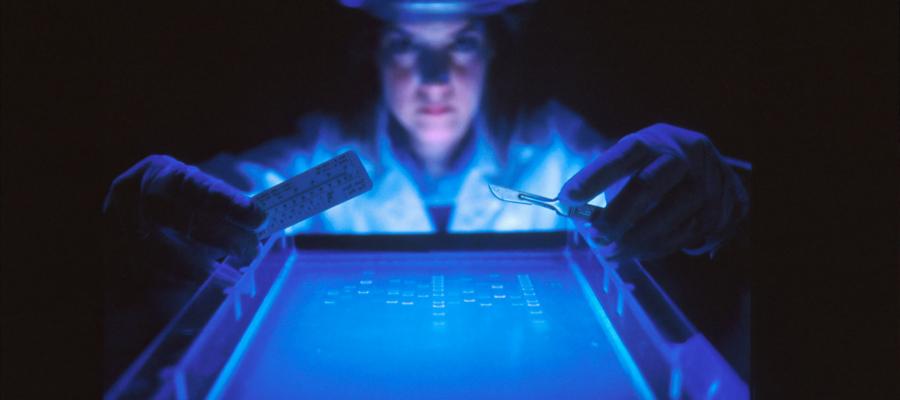Bioethics: Myths and Realities
Feb 10, 2013Recent advances in mapping the human genome suggest a vision of the future that might fill us with equal parts hope and dread.

Developments in genetics – in particular the mapping of the human genome – are tremendously exciting. For example, if we can correctly identify the disease carrying genes, we may be able to eradicate cancer. But new knowledge gives us new abilities. And new abilities give us new ethical dilemmas. This is so true in the field of biology that a whole new discipline has emerged – bioethics.
Designer babies are a common specter when people think about genetics and bioethics. Sounds pretty benign if you’re just envisioning parents who choose to have kids with defect-free genetic endowments. But it’s frightening to think of that power and knowledge in the hands of a latter-day Hitler.
But at this point, the idea of designer babies is a myth, not a scientific reality. We can’t literally reach into an embryo and just give it the genes we want. We don’t have that kind of power.
But perhaps we can get the same effect by the backdoor. We can use our vast new knowledge of the human genome to decide whether or not to implant embryos on the basis of their genetic make-up – without having to design the genes directly. This is what’s called “PGD” - pre-implantation genetic diagnosis. Suppose a couple is worried about passing on a genetic disease. Their eggs and sperm are combined to produce embryos outside of the womb. These are tested, and only the disease-free ones get implanted. This seems like the parents’ right, and a good thing.
Suppose, however, that deaf parents choose an embryo that will produce a child that will share their deafness? Arguably, deafness is not an intrinsic defect, but a social handicap in a world where there are lot of hearing people, and the structures for attaining and dispersing information are designed for the hearing. Such a decision strikes me as morally problematic. Why should parents deny a child a trait that, valuable and interesting as Deaf culture may be, is certainly a valuable trait to have? One could argue, however, that the particular child involved would not have existed had the parents chosen a different embryo. Does the child have a complaint; if the choice to have a hearing child would have meant that he or she wouldn’t have existed? Here metaphysics, genetics, and ethics conspire to make things difficult.
Where it’s legal to do so, you can use PGD to make sure you have a boy rather than a girl. Perhaps parents should have the freedom to choose the gender of their offspring. But an unfortunate pattern of individual decisions could lead to a gross imbalance in the sexes --- like the shortage of marriageable females in China, as a result of the “one-child” policy, and the disproportionate aborting of female fetuses.
How about parents using PGD to determine hair color, or eye color, or to make sure they have a paler or darker child? One might not admire the desire to control the appearance of one’s child. But would it be unethical, or within the rights of a parent? It’s hard to pinpoint long-term consequences of changing the proportion of blue eyes and brown eyes in the population, but who knows?
How about choosing traits like intelligence and athletic ability? Or what about cases where, in the interest of family unity and empathy, clumsy parents choose to have a child with limited athletic ability, or happily normal parents make sure that their child won’t be extremely intelligent.
Perhaps mercifully, here we have gotten back into the realm of science fiction, not science fact. According to my no doubt superficial understanding of things, such choices would require knowing more about how genes produce traits than we actually do. With some diseases – and perhaps some basic traits, like hair color – we may have a good idea of which genes make the difference. But athletic ability and intelligence depend on a whole host of factors, not just one gene. So nothing like what we are imagining is on the horizon.
Still, there is a clear danger that our knowledge and power are outpacing our wisdom. To return to the example of gender, it seems that left to its own devices, human reproduction has evolved to produce just slightly more males than females. Once we start mucking around with reproduction, the natural gender balance is bound to get all out of whack. And that could have enormous downside consequences for our cultures and societies.
Another issue is how much of what can be determined about a given person’s genetic traits should be known, and by whom it should be known. For example, we can now determine whether a person has certain genes that predispose her or him to Alzheimer’s. I’d kind of like to know this about myself; at 70, I might eschew long term projects if I am predisposed, and be more willing to start a multi-volume work if I am not. My doctor is skeptical; she points out that if I have the gene, there is nothing I can do about it. She means that there is no cure; the knowledge would just make me miserable. I think she is a little unimaginative. Do I have the right to know everything that can be known about me, if I can handle the expenses? Does it ever make sense for physicians to know something about me, and refuse to share it with me?
So, there is plenty to discuss, and we have a wonderful guest to discuss these issues with, the Stanford philosophy Ph.d David Magnus, who now is a resident ethical expert at the Stanford Medical School.
Photo by National Cancer Institute on Unsplash